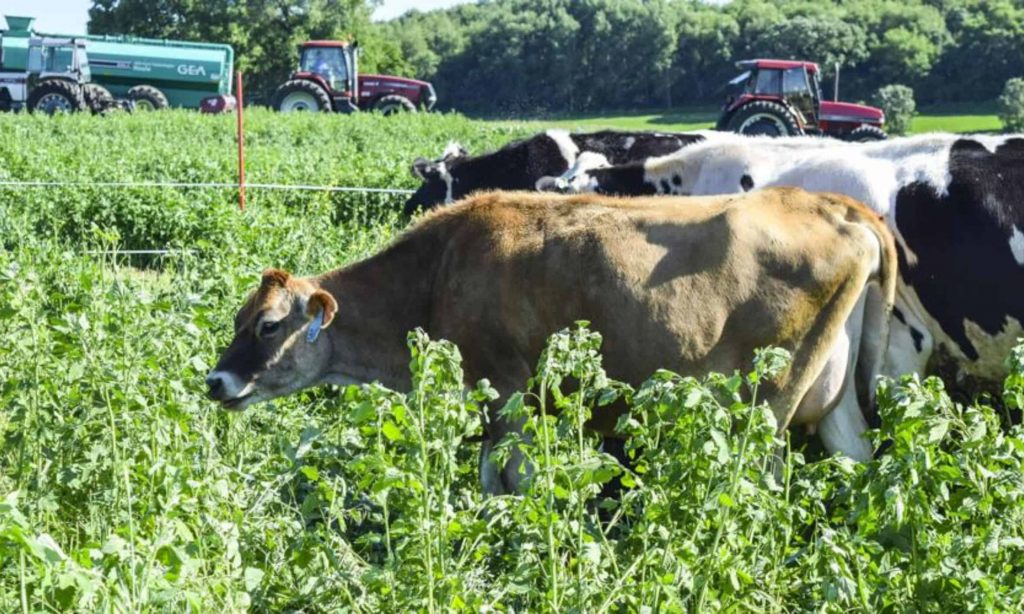Within the study, residents of four counties expressed concerns about outside investors buying land for residential development as well as for solar-power generation.


Within the study, residents of four counties expressed concerns about outside investors buying land for residential development as well as for solar-power generation.
Claudine Pied, an associate professor of sociology, conducted the study along with Shan Sappleton, an associate professor of political science, both at UW-Platteville. The project involved in-depth interviews with 55 residents of the counties, both dairy farmers and other individuals with connections to the dairy industry. And a survey of 57 questions was sent to dairy producers in Wisconsin’s Grant, Dane, Crawford and Lafayette counties; it also was available online.
The researchers received 398 responses to the survey. Of the total respondents, 86 percent were dairy farmers or other farmland owners. The other respondents were comprised of people who had been raised on farms or whose businesses rely on farms, Pied said. More than half of dairy producers who responded to the survey had herds of fewer than 99 milking cows. And of those producers, about half farmed in either Grant or Dane counties.
Both interview and survey results indicated that respondents from the four counties were concerned that outside investors – as opposed to neighbors or people the respondents already knew – were buying land. They indicated it was having a negative effect on agriculture. The investors were buying land for residential development or solar-power generation.
More than half of survey respondents indicated that farm consolidation was having a negative effect on the environment.
In the interviews respondents expressed loss of a sense of community. Fifty percent of those respondents added that there had been a decline in religious and family values. They talked about how life had changed from when they were raised on their family farms. They also pointed to communities becoming smaller and to a decline in schools.
“We heard about that a lot,” Pied said.
The researchers asked participants to tell them about their connections to farms. Dairy farming, land and family were discussed in generational terms – looking back as well as looking forward. The respondents expressed a strong commitment to maintaining connections to farm and land, often because of family history. They acknowledged that for the next generation to take over the farm there needs to be an investment in it. But families don’t want to commit to such an investment if they’re not sure there will be another generation to take over the farm.
A Grant County dairy farmer in his 30s said, “The next generation, I think, is starting to realize that they want back on the farm. But to do that (the farms) need to be consolidated and have larger numbers to be able to put pencil to paper, to make it really flow. Yes I am sad to see the exit of many small farms, but largely I don’t think it’s because of the industry itself. I think it’s because there’s no one to step in.”
The researchers studied the role of political ideology and resistance to the government and how those factors may be affecting responses to concerns.
“There’s distrust of government programs to be able to solve problems,” Pied said.
When asked whether government programs or farmer ingenuity and work ethic best preserve dairy farming and farmland, 75 percent of respondents said farmer ingenuity and work ethic. The researchers found that farmers with smaller herd sizes were more likely to be resistant to government programs. There was greater positive response from respondents having larger herds. But responses indicated acceptance and openness to programs, she said, if participants can see a positive effect and if the programs make sense financially.
The researchers asked about specific policies such as conservation easements, the Farmland Preservation Tax Credit and the U.S. Department of Agriculture’s Conservation Reserve Program. About 68 percent of respondents said they support the Farmland Preservation Tax Credit.
Respondent age affected how a sense of community is observed. People aged 60 or older were more likely to voice concerns about a decline in the sense of community, Pied said. That was related to generations, but also because older people are more likely to be isolated.
“So these are the kinds of things I think we need to pay attention to as we’re making decisions of who are the people that are going to be most affected by some of these changes,” she said. “As we’re thinking of this connection to land, and the resistance to solar farms and to residential development, we also need to pay attention to the ways in which people are dependent on these land-use changes for retirement and for income.”
Policy responses to land-use concerns should acknowledge the role of farm size, age, county and financial need, she said.
Legal notice about Intellectual Property in digital contents. All information contained in these pages that is NOT owned by eDairy News and is NOT considered “public domain” by legal regulations, are registered trademarks of their respective owners and recognized by our company as such. The publication on the eDairy News website is made for the purpose of gathering information, respecting the rules contained in the Berne Convention for the Protection of Literary and Artistic Works; in Law 11.723 and other applicable rules. Any claim arising from the information contained in the eDairy News website shall be subject to the jurisdiction of the Ordinary Courts of the First Judicial District of the Province of Córdoba, Argentina, with seat in the City of Córdoba, excluding any other jurisdiction, including the Federal.
1.
2.
3.
4.
5.
eDairy News Spanish
eDairy News PORTUGUESE
